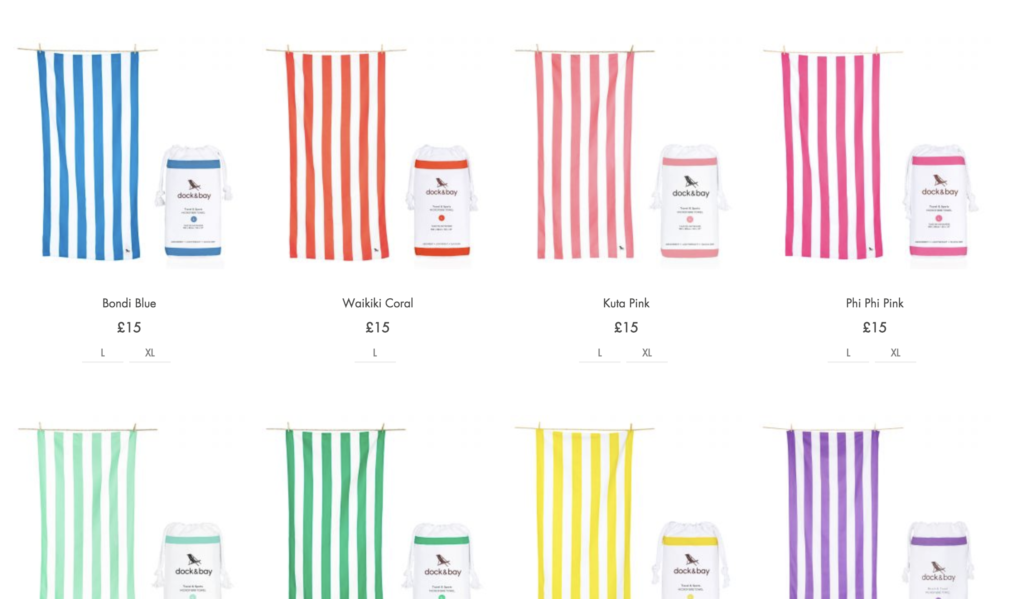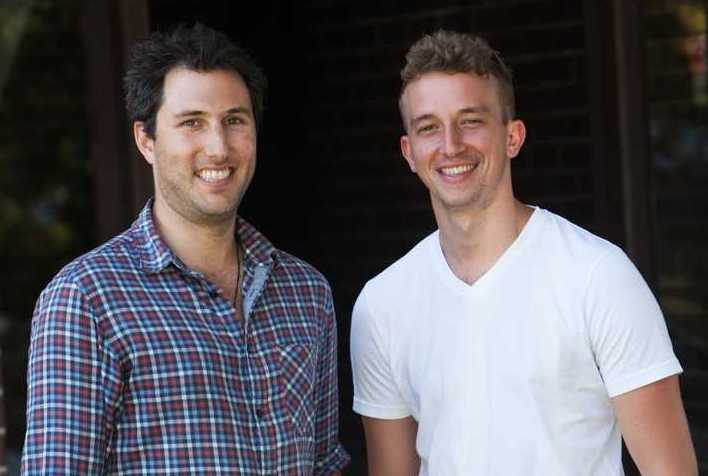Since a victorious showing on BBCs Dragons’ Den in 2017 when the company secured investment from Deborah Meaden, beach towel brand Dock & Bay are on track to grow sales to £4 million this year.
Here they describe the challenges of scaling a business internationally, explain its revenue streams and the importance of engaging customers online.
What is the business, when was it started and what were you doing beforehand?
Dock & Bay has become known for our unique travel towels that take a completely different stance to the traditional towel. They dry quicker, absorb more, take up less space and don’t get sand stuck to them – to name just a few of their great benefits. Add our distinctive stripes and there you have Dock & Bay.
We started back in Feb 2015 when Ben (my business partner) and I were both working for a corporate bank in their Digital division. On paper it was the perfect role to really show a bit of creativity for the future of banking but with all the rules and regulations that sit within the corporate world, our ideas weren’t going anywhere!
How did you get the idea, and what opportunity did you see when you started the business? What are your sales and what do you expect the turnover potential to be?
Ben and I love to travel, it’s what life is all about. Annoyingly Ben has visited double the countries to me (60 plays 30) but I’ll have to work on that. So, one of our biggest bug bears was the amount of room traditional cotton towels took up in your backpack. It was a no-go really. They’d also take ages to dry and smell really quickly. Travel towels were on the market but were dull. Not a product to be proud of. We thought we could change the game and here we are. Colour is our everything.
Last year we turned over £2.5 million globally, and on track to turn over around £4 million by the end of this year. We have every faith of being a £20 million turnover business in five years, especially if we can really crack America – which is currently our biggest market. It’s a key part of our strategy.
How did you finance it and what were the challenges of that?
Ben financed £30,000 with his savings and I borrowed £25,000 from the bank plus £5,000 from my parents. It was a major benefit of working in corporate jobs. It made it a lot simpler for me to get finance as I still worked for the bank when we kicked off. The big challenge was the risk we were taking. We went with the theory that if it didn’t work, we could sell our product at cost price easily enough and get our investment back. There’s definitely some flawed logic in there but lucky for us, it paid off.

What were your key marketing strategies?
Our first strategy was to launch into markets through Amazon (UK, Europe and USA to start). We had a unique product at a good price point so felt we could make headway on their markets. We had a website set up too but didn’t spend any marketing money on it. We’ve then used the success of Amazon to build more into the successful markets through a particularly heavy spend on creating unique and engaging Facebook ads.
Now we’re a bit further down the line, we’re taking bigger risks to get our name out there. Just this year, we took 17 people out to Bali for a week (six competition winners) to film our summer campaign focused around bring down to earth people together to create great content! And it worked a treat.
See more:
Entrepreneur Interview: Nayna McIntosh, Founder of Hope Fashion
The Starling Bank CEO on why raising money for a bank is different
Entrepreneur interview: Sachin Dev Duggal, co-founder of Engineer.ai
What are the revenue streams?
This has changed as we’ve grown but so far this year, we’ve been:
50 per cent – Amazon
30 per cent – Website
20 per cent – Wholesale
Our wholesale has grown substantially in the UK this year, especially following Dragons’ Den and we are now planning to focus more on growing our retail footprint in the USA.
What are the main challenges have you experienced and seen?
Our constant search for cash always causes some stressful starts to each year. We’re a very seasonal business currently so end up cash-rich in summer but cash poor ahead of the following summer. We have to take big punts on the fact that we ‘may’ meet our targets and not just meet them but be ready to exceed them. No-one wants to be left out of stock. We took out loans this year to finance our summer stock. People always think that it means we’re not profitable as a business so require loans but it’s not the case at all. Cash is king!
We also ship to six different warehouses around the world, all of which require a level of buffer. Making those unknown, substantial predictions is pretty scary but great fun.
Getting my head around dropping £30,000 of loaned money on towels wasn’t an easy ride at first.
What advice would you give to early-stage businesses looking to disrupt markets?
Embrace being different with your ideas and having dreams that others may never understand. There will always be pessimists, people that don’t believe in you, people that don’t understand why you want to follow a different path to the norm. But for every one of those, there will be people out there that are proud of you, that will do anything to help you and will be there for every step of your journey. Keep those people close. They are in your life for a reason.
See the world as one place. Just because you’re sat in the UK, doesn’t mean your biggest market couldn’t be in Brazil, without you ever stepping foot in that country. Find your uniqueness, do your research and run with it. Get started. The baby steps will get you far like choosing a brand name or logo, something to rally behind.
Don’t get bogged down with a big strategy early on, just give it a go.
The internet is a phenomenal learning tool, and someone out there has always asked the questions that run through your brain, so take a look. Learn from others. And never stop asking questions.
Andy Jefferies is co-founder of Dock & Bay






